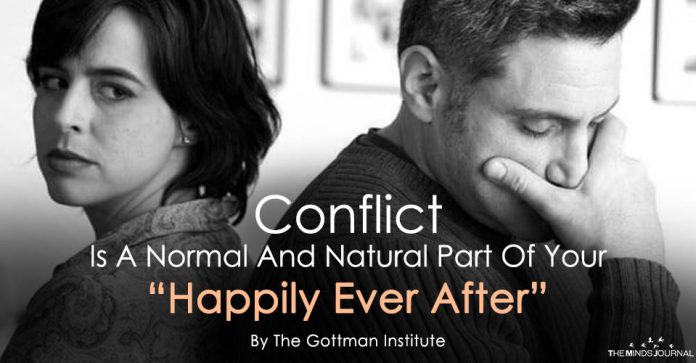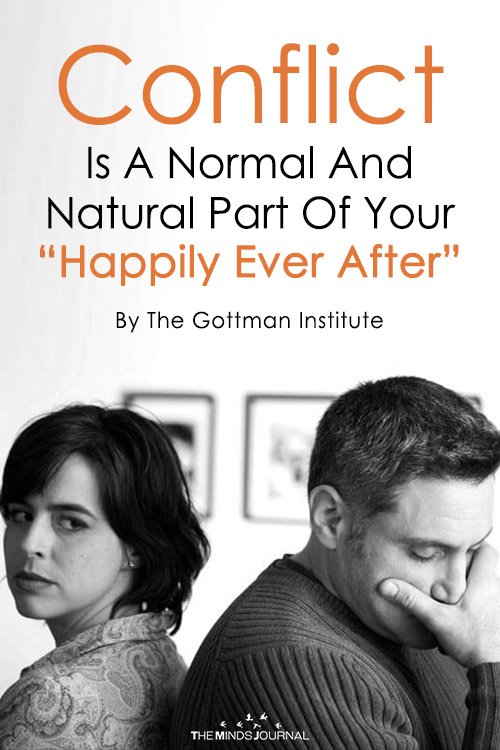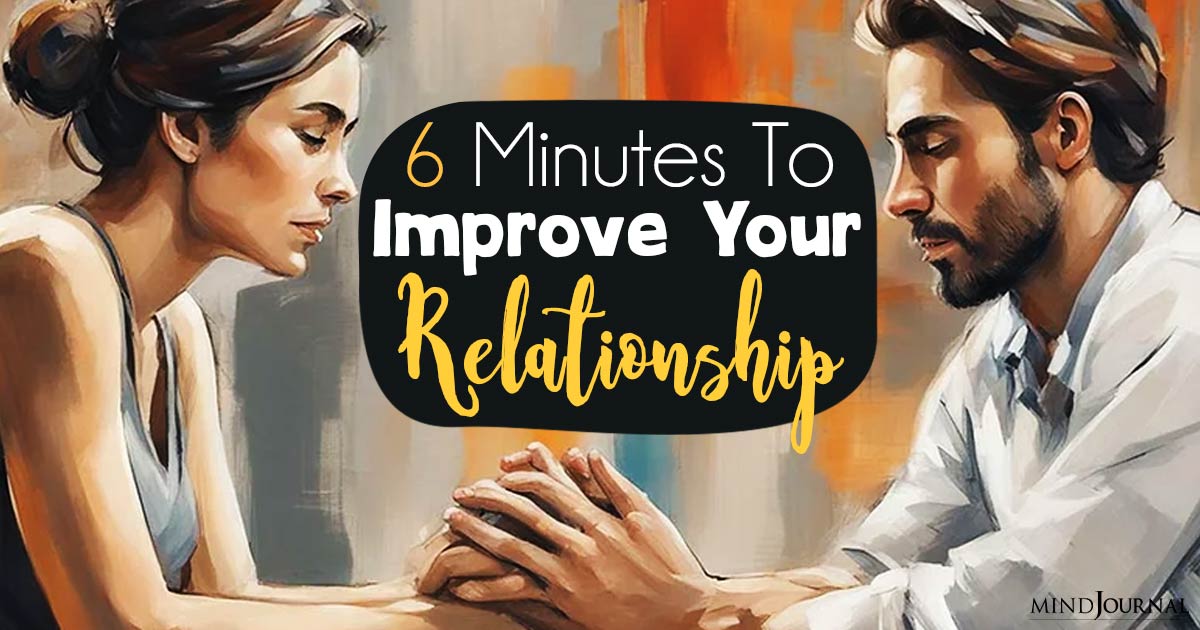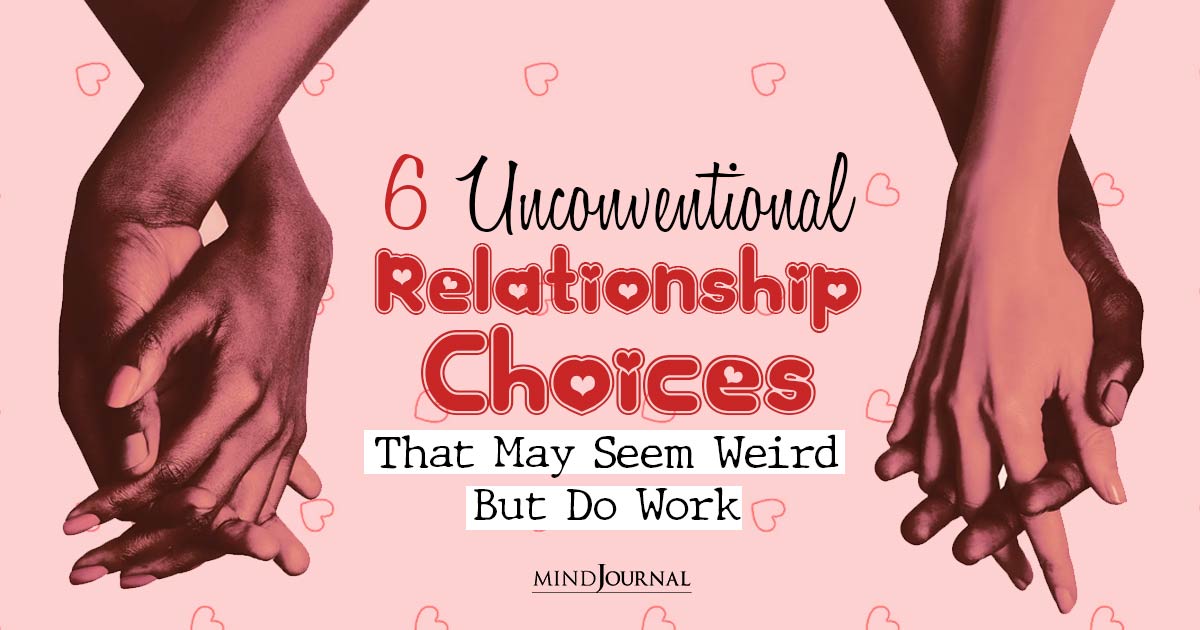Conflict Is A Normal And Natural Part Of Your “Happily Ever After”
When Sara and Ryan were newly married, they experienced a handful of frustrating conversations that evolved into emotionally-charged disputes.
Sara was devastated.
She thought that their relationship was in a bad place and that they were, perhaps even worse, doomed for divorce.
That’s because Sara loathes conflict. Like, really, really loathes it. And so, whenever things aren’t going perfectly well in her relationship, she’s a total mess.
Her husband, Ryan, has always been okay with conflict and doesn’t feel a need for things to be resolved immediately. While Sara is the type of person who never wants to go to bed angry, Ryan is a firm believer that going to bed angry is sometimes the best option.
You see for Sara, conflict breeds stress and the false assumption that her marriage is terrible, irreparable, and that it might end in divorce even though she and her husband are both deeply committed to making it work and staying together through thick and thin.
What Sara didn’t realize as a young love-struck newlywed is an important lesson for all married couples: conflict in marriage is inevitable.

One more time: conflict in marriage is inevitable.
In fact, not only is conflict in marriage inevitable, but it’s also perfectly normal.
It’s a part of life.
Why do you think wedding vows include phrases like “for better for worse,” “for richer for poorer,” “in sickness and health,” and “through thick and thin?”
They include those phrases because a) the people who wrote those vows are pretty smart and have experienced this thing we call “marriage” and b) conflict is an unavoidable part of life, and therefore, an unavoidable, and even important part of your “happily ever after” – even though it’s not something you see in the movies!
In reality, Sara was in error over the years by believing that if there was a conflict in her marriage, she couldn’t be truly happy since conflict was a clear sign that her marriage was doomed to fail. Sara was in error by thinking that a happy marriage was synonymous with the absolute extinguishment of all conflict. So. Not. True.
Sara was wrong. Way wrong! And perhaps that’s because Sara and Ryan had limited conflict-management skills and sometimes even used The Four Horsemen. Gasp!
To Sara, and others like her, it’s time to realize this truth taught by Dr. Gottman: “It’s a myth that if you solve your problems you’ll automatically be happy. We need to teach couples that they’ll never solve most of their problems.”
Really? Sara and Ryan will never solve most of their problems? Yup, that’s right.
Thankfully, the key to a happy marriage isn’t to eliminate all conflict. Mind-blowing!
Dr. Gottman says, “Although we tend to equate a low level of conflict with happiness, a lasting relationship results from a couple’s ability to manage the conflicts that are inevitable in any relationship.”
Did you catch that? Being happy now and living happily ever after comes “from a couple’s ability to manage the conflicts that are INEVITABLE in any relationship.”
Conflict is inevitable – no matter who you marry.
Please don’t fall for the fallacy that you wouldn’t be dealing with X conflict if you had married Bob, because Bob would have come with his own set of problems. You know it’s true.
Because of this, gaining the skills and developing the ability to successfully navigate conflict becomes critical in creating happiness and harmony in your marriage.
So, what are those specific skills that will lead to happiness now and to your “happily ever after” in the future?
Watch out this interesting video to know about skills for healthy romantic relationships:
Dr. Gottman has provided the following six skills to help couples learn how to manage conflict and live happily ever after:
1. Practice Physiological Self-Soothing
Take a timeout when conflict arises. Go for a walk, take a bath, read a book, do whatever it takes to breathe, calm down, and return to a better frame of mind. How long is the perfect amount of time for a break? According to Dr. Gottman, it’s 20 minutes.
2. Use A Softened Startup
It’s true that conversations usually end on the same note they began, so start softly. Don’t blame. Use I-statements. Describe what is happening. And be polite.
3. Repair And De-Escalate
Use scripted phrases like “Let me try again,” “I don’t feel like you are understanding me right now,” and “I’m sorry” to help de-escalate and begin making repair attempts.
4. Listen To Your Partner’s Underlying Feelings And Dreams
Perpetual gridlocked problems between you and your partner often conceal underlying feelings and dreams that aren’t getting communicated. So, start by contemplating what your dreams are and how you can communicate them more clearly to your partner. Second, become a better listener and seek to discover your partner’s deepest feelings and dreams. The purpose of this skill is to truly understand who your partner is deep down inside in order to accept influence and compromise together. It helps couples manage conflicts.
Related: Help Your Partner Understand Your Side of the issue in 3 Steps
5. Accept Influence
This is a wonderful skill that helps couples manage conflicts. Recognize that your partner has good ideas and important opinions (shocker – your way isn’t always the best way or the right way). Show respect for those opinions and find something you can learn from your partner. Take this questionnaire to see where you most need to improve when it comes to accepting influence.
6. Compromise
Compromise is an art. What’s Dr. Gottman’s advice? “Compromise never feels perfect. Everyone gains something and everyone loses something… the important thing is feeling understood, respected, and honored in your dreams.” So work together with your partner to find common ground and compromise that will leave you both feeling valued, respected, and supported.
If you practice these six skills from Dr. Gottman and learn to manage conflict in positive and healthy ways, then happily ever after can be yours today and everyday as you recognize conflict for what it is – an opportunity to learn, grow, progress, and live a full and meaningful life now.
By Aaron & April Jacob
This article was originally published on The Gottman Relationship Blog.
Want to use conflict as a catalyst to achieve your happily ever after? Then get your free copy of 7 Signs Your Relationship Will Last here to learn how.










Leave a Reply
You must be logged in to post a comment.